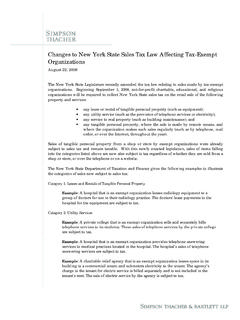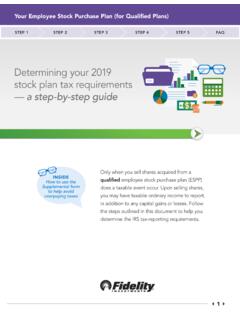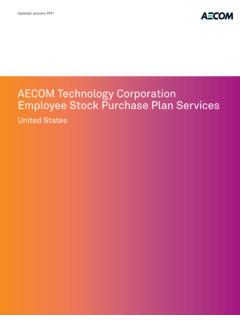Transcription of IRS Issues Final Regulations Relating to Employee Stock ...
1 IRS Issues Final Regulations Relating to Employee Stock purchase Plans and the Reporting Requirements for Employee Stock purchase Plans and Incentive Stock Options February 17, 2010 EXECUTIVE SUMMARY In November 2009, the Internal Revenue Service (the IRS ) issued Final Regulations Relating to options granted under an Employee Stock purchase plan ( ESPP ) as defined under Section 423 of the Internal Revenue Code, as amended (the Code ). These Final Regulations are effective as of November 17, 2009, but will only apply to ESPP options granted on or after January 1, 2010. In addition, in November 2009, the IRS issued Final Regulations Relating to the return and information statement requirements applicable to the exercise of options intended to qualify as incentive Stock options under Section 422 of the Code ( ISOs ) and the transfers of Stock acquired under an ESPP, pursuant to Section 6039 of the Code.
2 These Final Regulations are also effective as of November 17, 2009, but will apply retroactively as of January 1, 2007. Final Regulations Relating TO OPTIONS GRANTED UNDER Employee Stock purchase PLANS Background Section 423 of the Code provides favorable tax treatment for Stock acquired through an option granted under an ESPP that meets the statutory requirements set forth therein. Under Code Section 423, there is no tax to an Employee or deduction for an employer when an option exercised under an ESPP (i) has a discounted purchase price of at least 85% of the lesser of the fair market value of the underlying Stock on the date the option is granted or exercised; (ii) is held by the Employee for at least two years from the date of grant and one year from the date of exercise; and (iii) satisfies the other requirements of Code Section 423. Instead, any appreciation in excess of the discounted purchase price is taxed at the time of sale of the Stock at long-term capital gains tax rates.
3 While the Regulations under Section 423 of the Code were last updated in 2004, proposed Regulations were issued by the IRS in July 2008. The current Final Regulations largely adopt the proposed Regulations and provide a comprehensive set of rules Relating to options granted under an ESPP, the key provisions of which are set forth below. Page 2 Memorandum February 17, 2010 Options with Terms Inconsistent with ESPP or Offering Terms The Final Regulations clarify that an option will not be treated as being granted under an ESPP if its terms are inconsistent with the terms of the ESPP or an offering under the ESPP. However, an option may still qualify for favorable ESPP tax treatment, even if the terms of the ESPP are inconsistent with any of the requirements of Code Section 423, if the option is granted under an offering with terms that comply with such Code requirements. Multiple Offerings The Final Regulations also add a concept of separate offerings.
4 An employer may make multiple offerings under an ESPP and these offerings may be consecutive or overlapping. The terms of each offering need not be identical. Accordingly, the employer may determine with respect to each offering whether part-time employees and/or highly compensated employees should be excluded and what the rights and privileges applicable to the employees participating in the offering will be (for example, as to the level of permitted contributions). However, such exclusions and rights and privileges must be applied in an identical manner to all employees participating in that offering and the ESPP and the offering, together, must satisfy the requirements of Code Section 423. Under the Final Regulations , an employer may designate which subsidiary corporations of the parent corporation may participate in a particular offering as well, as long as the terms of each offering, together with the ESPP, satisfy the requirements of Code Section 423.
5 Determination of Grant Date Under the Final Regulations , the date of grant of options under an ESPP will be the first day of an offering period only if the terms of the ESPP or the offering either (i) designate a maximum number of shares that may be purchased by each Employee during the offering; or (ii) require the application of a formula to establish, on the first day of the offering, the maximum number of shares that may be purchased by each Employee during the offering. The ESPP or the offering is not required to designate the maximum number of shares, or a formula to establish the maximum number of shares, that may be purchased by each Employee during the offering. However, if either the ESPP or the offering fails to make this designation, then the date of exercise will be the grant date of the option, rather than the first day of the offering period. The consequence of this is that the holding period for favorable ESPP tax treatment would run for a full two years following the date of exercise.
6 The Final Regulations state that references to the annual $25,000 limit (as discussed below) and the limit on the aggregate number of shares that may be issued under an ESPP are not sufficient to establish the maximum number of shares that can be purchased by an Employee under an option. Because many ESPPs contain this language, plan documents may need to be revised accordingly. Annual $25,000 Limitation According to Code Section 423, an ESPP must, by its terms, provide that no Employee may be permitted to accrue the right to purchase , under all ESPPs of his or her employer corporation and its related corporations, Stock worth more than $25,000 (determined on the grant date) for each calendar year in which an option granted to the Employee is outstanding. Code Section Page 3 Memorandum February 17, 2010423 further provides that the right to purchase Stock under an option accrues when the option first becomes exercisable.
7 The Final Regulations clarify that the annual limit increases by $25,000 for each calendar year that an option is outstanding (without regard to exercisability), so that if an offering overlaps two calendar years, the unused portion of the $25,000 limit from the prior calendar year may be carried into the next year under the same offering. Stockholder Approval According to Code Section 423, an ESPP must be approved by the stockholders of the granting corporation within 12 months before or after the date the ESPP is adopted. The Final Regulations clarify that new stockholder approval is required if there is a change in the shares (such as an increase in the aggregate number of shares available under the ESPP) with respect to which the options are issued or a change in the granting corporation. In addition, the Final Regulations clarify that the stockholders of a subsidiary corporation include the parent corporation and any other stockholders of the subsidiary.
8 Foreign Employees Code Section 423 generally requires that all employees participating in an ESPP or offering have the same rights and privileges. For employers with employees in foreign jurisdictions with conflicting legal requirements, this has often been problematic. As a result, the Final Regulations make it clear that an ESPP or an offering will not fail to qualify under Code Section 423 if the terms of an option or offering to employees in foreign jurisdictions are less favorable, in order to comply with the laws of a foreign jurisdiction, than the terms of options granted under the ESPP or the offering to employees. Many ESPPs have provisions with respect to foreign employees that may be different, although not necessarily less favorable. Therefore, plan administrators may wish to revise ESPP plan documents to take advantage of this provision of the Final Regulations .
9 Effective Date The effective date of the Final Regulations is November 17, 2009. However, the Final Regulations only apply to options granted under an ESPP on or after January 1, 2010. Action Items Employers should carefully review their ESPPs and adopt any necessary amendments to comply with the new Regulations . Final Regulations ON THE REPORTING REQUIREMENTS OF INCENTIVE Stock OPTIONS AND Stock ACQUIRED UNDER AN Employee Stock purchase plan Background Section 6039 of the Code requires employers that grant ISOs and options under ESPPs to furnish a written statement regarding an Employee s transfer of Stock pursuant to his or her exercise of Page 4 Memorandum February 17, 2010an ISO or an option under an ESPP to (i) the Employee and (ii) the IRS. While both these requirements have existed since 2006, the IRS has previously waived the obligation of an employer to file an information return with the IRS for any Stock transfers occurring in 2007 or 2008.
10 However, the Final Regulations now mandate the filing of such returns with the IRS. Under the Final Regulations , the return requirements are not applicable to employees who are nonresident aliens and to whom the employer is not required to provide a Form W-2 for the relevant period. The Final Regulations provide clarification on the reporting requirements necessary pursuant to Code Section 6039, the key provisions of which are set forth below. Return and Information Statement Requirements for Stock Acquired Pursuant to the Exercise of ISOs With respect to the transfer of Stock pursuant to the exercise of ISOs, the information required in the return and the information statement under the Final Regulations is the same information that is required under the proposed Regulations , except the new requirement to report the exercise price per share of options exercised rather than the total cost of all shares acquired.













